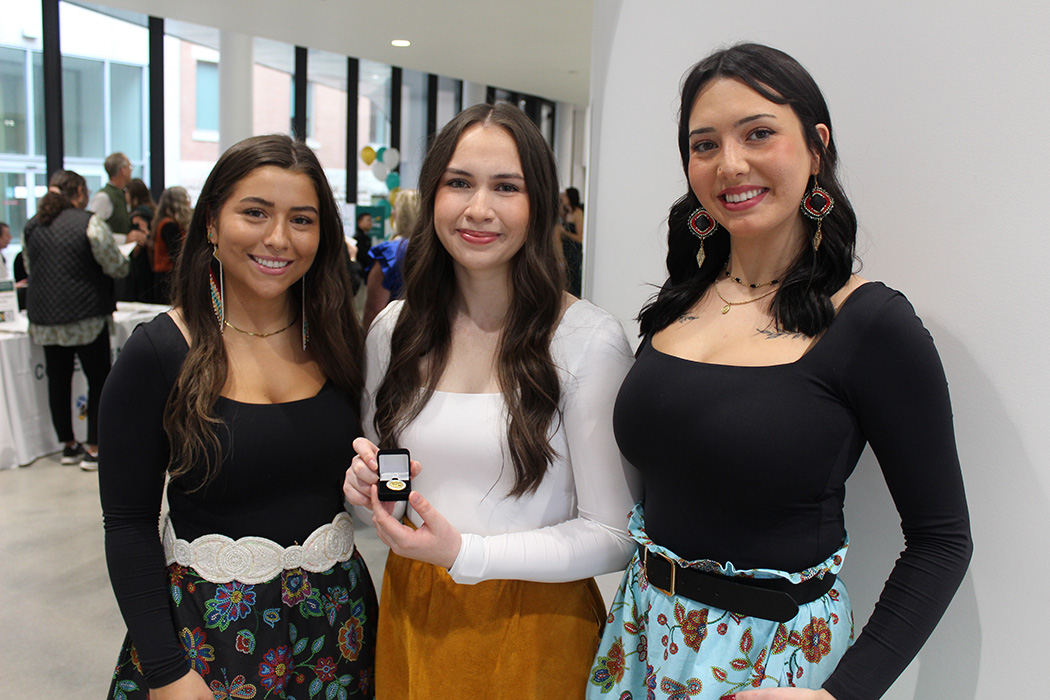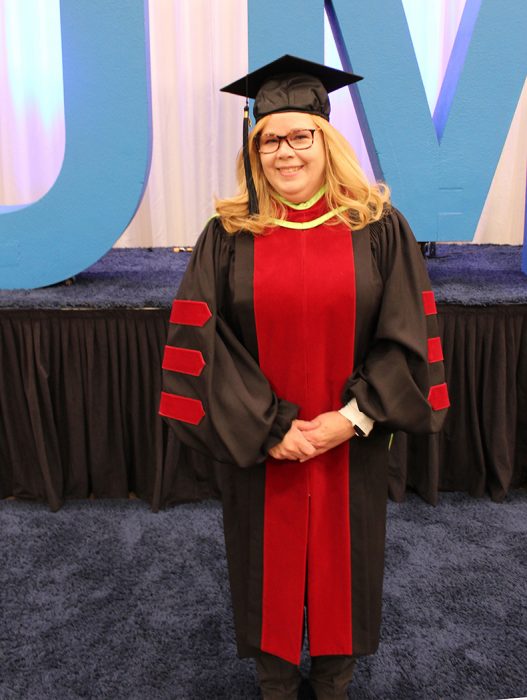
(L to R) Kelsey Dykun, Justice Spence and Harper Johnson were among 12 Indigneous graduands to recieve their UM nursing pin on Oct. 22.
Over 100 new nurses welcomed to profession
The College of Nursing welcomed 105 new nurses to the profession at a pinning ceremony on Oct. 22 at the new Desautels Concert Hall, a few hours ahead the graduands’ convocation.
The ceremony, emceed by College of Nursing dean Dr. Netha Dyck, included remarks by Minister of Health Uzoma Asagwara, grandmother-in-residence Sherry Copenace, and Association of Regulated Nurses of Manitoba executive director Joyce Kristjansson. Dr. Lisa Monkman performed an honour song.
“The pinning ceremony is not just a time-honoured tradition, but a rite of passage that has been cherished in the nursing community for over a century. It symbolizes not only your academic success, but your commitment to the values, responsibilities and code of ethics of the nursing profession,” Dyck told the 2024 graduating class.
After receiving their pins, the graduands recited the UM Bachelor of Nursing Pledge, which was inspired by the 1893 Florence Nightingale Pledge and has been adapted by the university.
Among the graduates was Behnam Behboodinejad, who moved to Winnipeg from Iran with his sisters in 2017. He comes from a family of health-care professionals, and will be working at St. Boniface Hospital, where he completed his last clinical rotation.
Behboodinejad said one of the highlights of the program was during a clinical rotation when he cared for a patient post-surgery and got to see her progression over the next few days.
“For me, to see that while caring for her and getting to know her family members was one of the most hopeful moments in my life.”
He said he is interested in returning to UM to pursue a master’s degree in nursing after gaining some clinical experience.
Behboodinejad was one of two valedictorians, along with Parneet Kaur, who moved from India to Winnipeg in 2019. She loves working with kids and is looking forward to working in pediatric intensive care.
The Fall Class of 2024 also had 12 Indigenous graduates, including Justice Spence, who praised the college’s Mahkwa omushki kiim: Pathway to Indigenous Nursing Education (PINE) initiative, which supports First Nations, Métis and Inuit students in, or preparing to enter, the bachelor of nursing program.
“PINE meant a lot to me on my nursing journey. The tutoring and having our own skills lab made me a lot more comfortable. I think that really contributed to my success because I didn’t always feel safe in the space with everyone else, but I felt very comfortable coming to PINE and working in those spaces,” she said.
Spence is looking forward to working in emergency at Thompson General Hospital, where she recently completed her practicum. She is also interested in returning to PINE one day to work with future Indigenous nursing students.
“The students in PINE really understand the meaning of family.”
At Convocation, the college also had 20 graduates from its master’s program, including 17 from the nurse practitioner stream, and one from its PhD in Nursing program.

Kristen Valeri
Kristen Valeri is UM’s newest nursing PhD graduate. She has over 30 years of nursing experience in Manitoba, including 10 years as a front-line care worker and 10 years as a first-line manager. Currently she is an executive director for provincial patient safety quality and accreditation at Shared Health.
Valeri’s thesis was on first-line managers’ perspectives on employee engagement, active disengagement and burnout through the COVID-19 pandemic. She said managers at this level have been identified as key to improving employee engagement; however there is not a lot of research from the perspective of first-line managers.
“There are lots of benefits to staff engagement – it means better care for patients, a better work environment for staff and numerous better outcomes for organizations, including an increase in staff retention.”
The mother of two said she’s thankful that the program allowed her to earn her PhD in her home province.






